
Personal hygiene is essential for keeping clean and presentable. It is an important aspect of grooming and adds greatly to your overall personality.
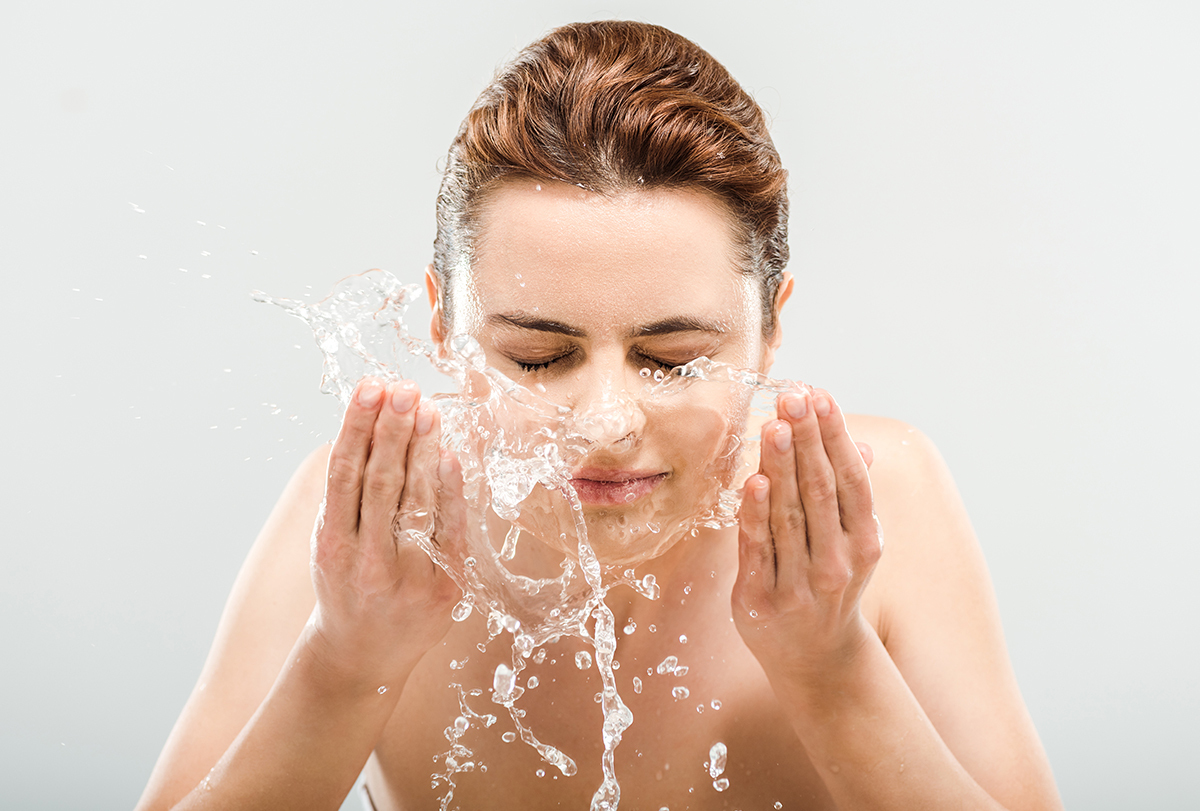
Not just that, practicing good hygiene protects you from a variety of ailments and helps control the spread of infection from one person to another. (1)
But for it to work, you must do it right. Unfortunately, a lot of people have got the basics wrong, and this article will help set them right.
13 Personal Hygiene Mistakes You Should Stop Doing
Here are some of the common personal hygiene mistakes that people make and how to correct them.
1. Overbathing
Your skin is the most exposed part of your body and collects a lot of dirt, sweat, oil, dead skin, and germs daily. Thus, it is essential to take a bath regularly to cleanse these impurities from your skin so that it can breathe and function properly.
However, you must not go overboard with this step in the hopes that the more you wash your skin, the cleaner and healthier it will be.
Frequent or prolonged bathing is actually bad for your skin and hair. Excessive exposure to soap and water strips the natural lipids from your skin and scalp, making them dry and irritated.
Hot water is particularly drying, so it is recommended that you only use cold or lukewarm water for bathing. Dry skin lacks elasticity and is prone to tearing. Cracks in the skin allow easy entry to germs, resulting in an infection.
Meanwhile, a dry scalp is prone to dandruff and general irritation. Your hair also loses its shine and softness when exposed to water and shampoo every day. (2)
Overbathing can also exacerbate preexisting skin disorders such as eczema, dermatitis, and rosacea by triggering severe flare-ups of their inflammatory symptoms, which include dry patches, redness, itching, and general skin irritation.
2. Exfoliating too often
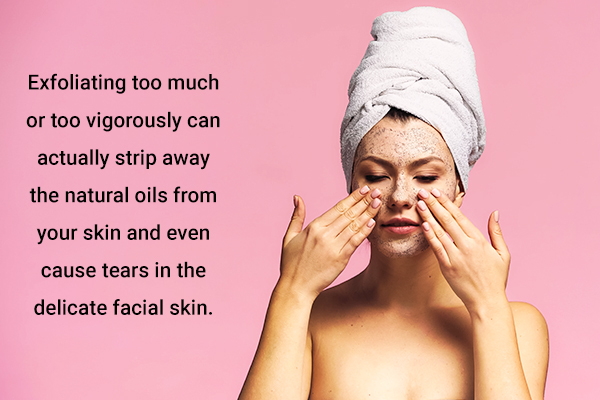
Exfoliation draws out the impurities from your pores, giving your skin a deep cleanse. Plus, it loosens the dead cells settled on top of your skin so that they can be removed easily, thereby revealing fresh new skin underneath.
However, exfoliating too much or too vigorously can actually strip away the natural oils from your skin and even cause tears in the delicate facial skin. So, it is important to do it with a gentle hand and no more than two or three times a week. If you have dry or sensitive skin, limit it to once a week.
Also, try not to scrub over active pimples as they may break and spread the infectious pus to the surrounding skin. (3)
3. Skipping flossing your teeth
Flossing is an often-neglected part of oral hygiene that needs more attention.
Simply brushing your teeth may not remove all the food debris stuck between them or beneath the gum line. As a result, bacteria will feed on the organic matter and grow to cause bad breath, plaque, cavities, and infections.
Dental floss is fine enough to clean the hard-to-reach crevices inside your oral cavity. This simple step can help preserve your dental, gingival, and overall oral health.
The general consensus among dental experts is to brush your teeth twice a day, post breakfast and before bedtime along with a round of flossing. (4)
4. Covering your mouth with your hand when you sneeze or cough
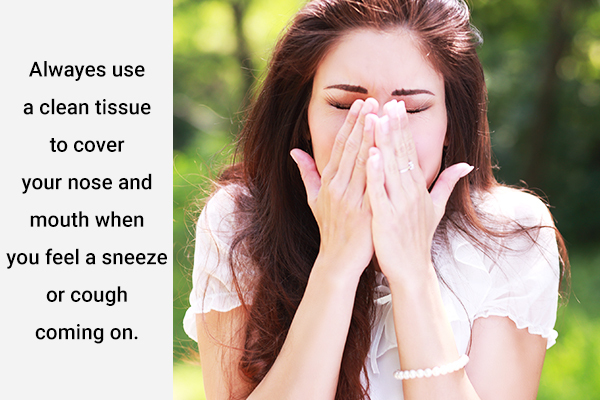
Coughing or sneezing expels airborne droplets (respiratory and salivary) into the environment that contain infection-causing microbes.
These droplets may be inhaled by anyone in the vicinity, who will then come down with the infection. Or they may land on surrounding surfaces, which if touched will contaminate your hands with the same infection-causing germs.
So, it is very important to cover your mouth and nose when sneezing or coughing to block the release of these infectious droplets.
People impulsively do this with their hands, but that only transfers the germs to their hands. As a result, the infection can spread to other people and surface through their contaminated hands.
So, it is better to use a clean tissue to cover your nose and mouth when you feel a sneeze or cough coming on. Make sure to discard the used tissue in a trash bin, rather than holding on to it or placing it somewhere else for later use. Also, wash your hands with soap and water thereafter.
If you don’t have a tissue readily available, bury your face on the inside of your elbow or shoulder.
An observational survey conducted in some busy public areas of Wellington City found that less than 5% of people visiting these locations covered their mouth in the correct way while sneezing or coughing. (5)
5. Not showering right after a workout
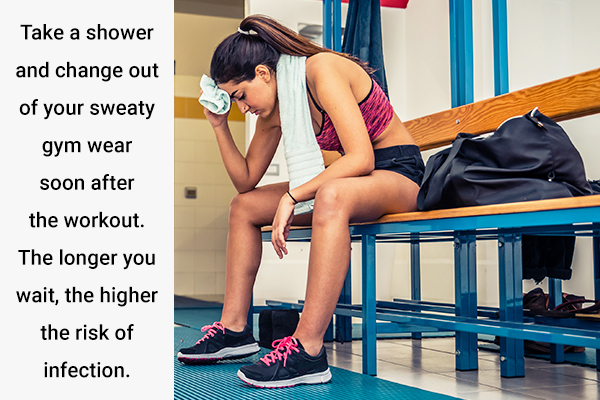
Working out makes your body temperature rise. The body releases the excess heat via perspiration. In other words, sweating is a way for the body to cool down its core temperature back to normal.
Your gym clothes soak in this sweat and become damp. This warm and moist environment provides a perfect breeding ground for bacteria that may get transferred to your skin causing an infection.
So, it is very important to shower and change out of your sweaty gym wear soon after the workout. The longer you wait, the higher the risk of infection.
6. Not washing your hands well and often
You use your hands to touch and hold things, and in the process, they pick up dirt and germs from various contaminated surfaces.
Cooking or eating food with the same unclean hands can end up transferring the germs into your body, resulting in gastroenteritis or other such infections.
Similarly, touching your face with contaminated hands can infect your skin and even transfer germs into your nasal passage or mouth, triggering an infection. Moreover, you can spread these infection-causing germs to other people via touching.
So, it is very important to practice proper hand hygiene, which demands that you wash your hand frequently with soap and clean water, especially after using the restroom, touching an animal, and meeting someone with an active cough or cold as well as before handling food.
This simple step can save you and others from a variety of common ailments. In fact, the Centers for Disease Control and Prevention (CDC) USA recognize handwashing as one of the most effective measures to prevent infections. (6)
Moreover, one independent study found that basic hygiene measures such as frequent hand washing with soap can decrease diarrheal disease death by 50%. (7)
Make sure to scrub under your fingernails when handwashing as this area harbors a lot of grime and germs. You should also carry an alcohol-based hand sanitizer when going out so that you can clean your hands on the go.
7. Using cotton swabs/Q-tips to clean the insides of your ears
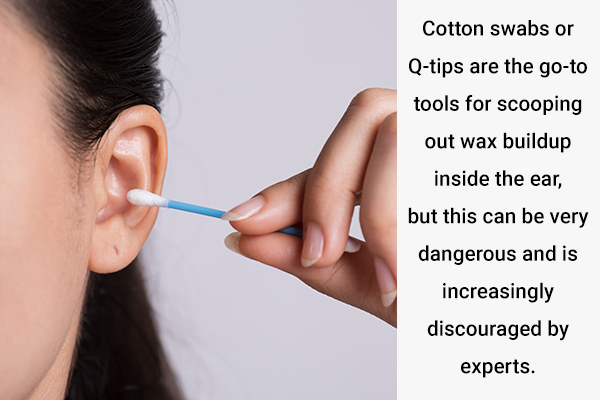
Cotton swabs or Q-tips are the go-to tools for scooping out wax buildup inside the ear, but this can be very dangerous and is increasingly discouraged by experts.
For starters, the inner walls of the ear cavity are extremely fragile and can easily be damaged by these sharp objects. Plus, the Q-tip can actually push the wax further into the ear canal, and inserting it too deeply can rupture your ear drum, leading to hearing loss. (8)
What you need to do is use the Q-tip to gently clean the wax and dead skin accumulated on the outer periphery of the ear, rather than shoving it inside.
For deeper cleaning, you may consider using earwax drops but only after learning the correct way to do so. It’s best to read the instructions on the product label and consult your doctor before using them.
Earwax drops dissolve the gunk inside your ear, which naturally moves toward the surface and can then be removed with a Q-tip.
8. Overwashing your face
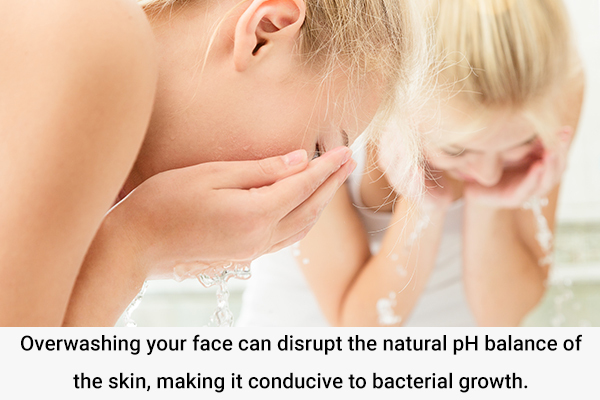
Some people mistakenly believe that the more they wash their face, the cleaner it will be. However, the excessive use of water and cleanser can actually damage your sensitive facial skin. It does so by stripping the natural lipids from your skin, rendering it dry, rough, and irritated.
The lack of moisture triggers the sebaceous glands under the skin to produce more oil to compensate for the dryness. Then the excess sebum clogs your pores, triggering acne breakouts. Plus, the drier the skin, the more likely it is to tear, which will compromise its barrier function.
Overwashing your face can also disrupt the natural pH balance of the skin, making it conducive to bacterial growth.
Skin experts recommend washing your face twice a day, first in the morning and then at night. Since your skin is mostly clean after waking up, you can even skip the morning session.
But you must always cleanse and wash your face before going to bed to get rid of all the dirt, dead skin cells, makeup, skin products, sweat, oil, and germs accumulated over the course of the day. Doing so allows your skin to breathe and repair itself overnight for a fresh and healthy appearance the next morning.
If you let these impurities stay on your skin overnight, they will trickle down into your pores, paving the way for acne and other skin infections.
9. Brushing your teeth too hard
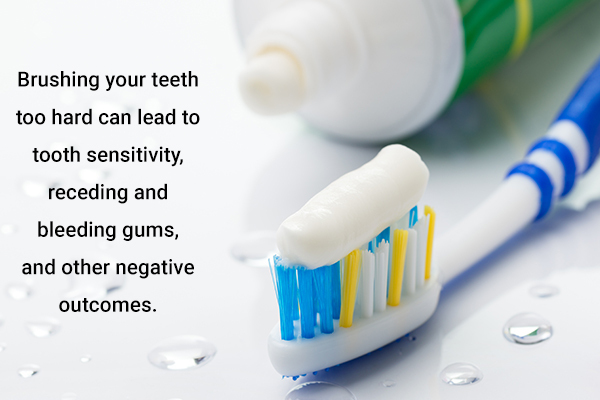
You may think that intense toothbrushing will help remove the stubborn dental plaque and stains, but it only corrodes your tooth enamel and sensitive gum tissue. This can lead to tooth sensitivity and receding and bleeding gums, among other negative outcomes. (9)
So, it is recommended to brush your teeth thoroughly on all sides, but with a gentle hand.
10. Neglecting intimate hygiene
When it comes to personal hygiene, both men and women usually don’t give their genital area the same attention as the rest of their body.
It is very important to groom and clean your private parts on a regular basis, but you must use the right products to do so.
Normal soap contains harsh chemicals that can irritate the sensitive skin in this area. Plus, it can disrupt the natural bacterial balance inside your vagina and thereby increase the risk of infection.
So, it is recommended that you use intimate hygiene products that are specially made for the purpose of cleaning the nether regions during your routine shower.
Proper intimate hygiene is especially important when you are having your period. (10)
11. Not washing your bed linen enough
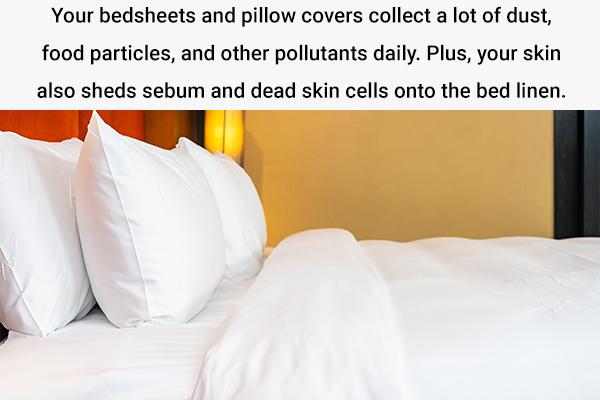
Your bedsheets and pillow covers collect a lot of dust, food particles, and other pollutants daily. Plus, your skin also sheds sebum and dead skin cells onto the bed linen.
The dust particles often contain dust mites, which feed on these human cells, and their fecal matter is a common source of allergen. (11)
Sleeping or resting on unclean bedsheets can transfer the dust mite feces, germs, and other impurities to your skin and trigger adverse reactions. So, it is important to wash your bed linen every alternate week.
12. Trimming your nails improperly
Cutting your nails too short will uncover the soft nail bed, which can get easily damaged and infected.
The nail bed also contains a lot of nerve endings, which make it highly sensitive. The exposed nail bed will therefore hurt when it touches or rubs against a hard surface.
Another mistake people make is rounding the corners of the nail to give it shape. As the nail plate grows back, it pierces the surrounding flesh, causing pain.
Then there are those who make the error of cutting their nails with a pair of scissors. It’s highly recommended to use a nail clipper to trim your nails straight across and then a nail file to smoothen the rough edges. (12)
13. Using too much conditioner and applying it to the scalp
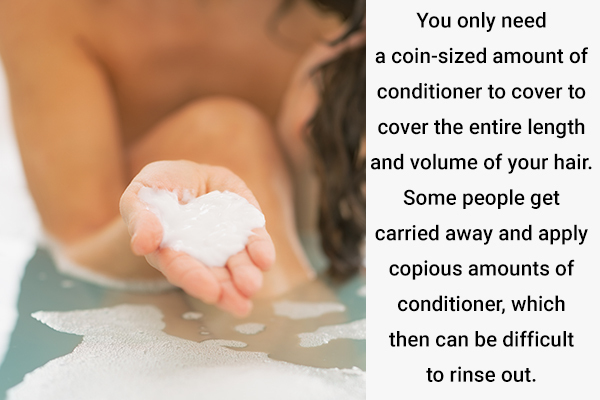
Hair conditioner is only to be used on the hair strands and not on the scalp as it can end up blocking your hair follicles and hampering hair growth.
Also, you only need a coin-sized amount to cover the entire length and volume of your hair. Some people get carried away and apply copious amounts of conditioner, which then can be difficult to rinse out.
The conditioner that’s left sticks to the hair and makes it look unclean and greasy. Plus, the residue settles onto the scalp, clogging your pores and increasing the risk of infection.







